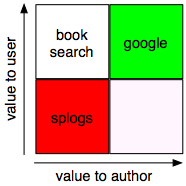Adding value to other's content

Who does the following scenario describe:
An online Web site grabs a bunch of content created by others and puts ads on it in an effort to generate cash. Content owners are angry at being exploited.
Splogs? Google? Actually, both.
Splogs (short for spam blogs) are fake blogs created programatically for the sole purpose of amassing a large cache of content. That content attracts traffic which can be monetized with ads. Splogs pollute the blogosphere, diverting traffic from real sites to the copies. This devalues links and upsets the people creating the traffic.
I couldn't help but notice the similarity of the arguments against splogs and the complaints of the Association of American Publishers (AAP) in their suit against Google. Here's part of their complaint:
[U]nder its current plan, Google is seeking to make millions of dollars by freeloading on the talent and property of authors and publishers."
Where's the difference? One I can think of is that we'd all love to use the Google book search service, but no one visits splogs on purpose. This isn't, of course, unlike what Google does in general: they spider my site and others and then make use of that content to create something they make money from. But the question of value-add works two ways: to content providers and to content users. Consider this graph:

Google provides value to the Google user and the author of the Web site spidered by Google. Splogs provide value to neither. Book search occupies a gray area that provides value to only one side--at least in the eyes of the AAP. Google needs to convince authors that they're providing real value--and perhaps share the value Google's generating. Note that the lower-right hand quadrant is a no-man's land since it's hard to image value to an author that doesn't also provide value to users.
If you're considering creating a Web site that makes use of the work of others, like planet sites and even mash-ups, ask what value you're providing both groups. If the answer is unclear, then maybe you need to rethink your strategy.